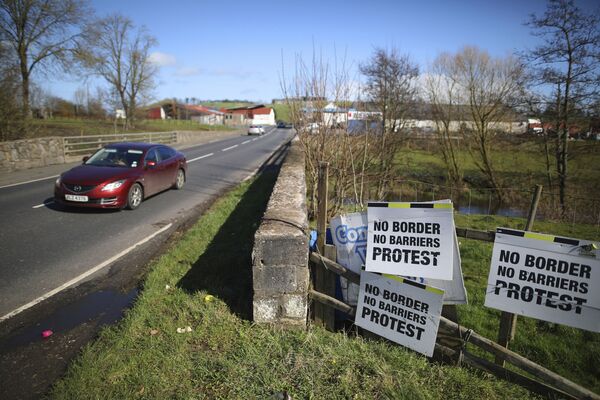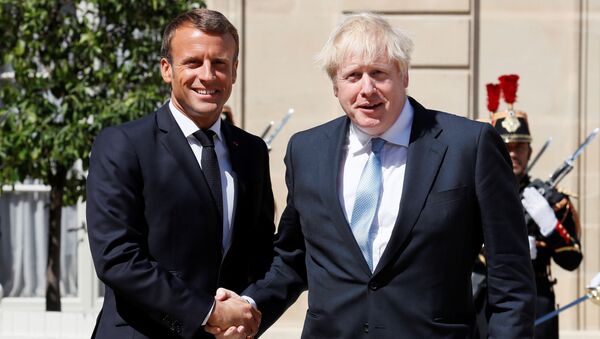French President Emmanuel Macron emphasised that the Irish backstop plan is "indispensable" to the EU-UK Brexit deal and cast doubt on the possibility of re-negotiating the agreement before the 31 October deadline during his Thursday meeting with British Prime Minister Boris Johnson.
"We cannot find a new Withdrawal Agreement within 30 days", the French president said adding however, that like German Chancellor Merkel he is "confident that with [their] collective intelligence and will to build should allow [them] to find an intelligent solution within thirty days."
Macron's remark came on the heels of Angela Merkel's Wednesday suggestion that the issue could be solved if London comes up with a workable alternative “in the next 30 days”. The chancellor later clarified that she had not set a literal deadline.
According to Dr Chris Reynolds, associate professor in contemporary French and European Studies at Nottingham Trent University it was obvious from the very beginning that the French president wasn't going to give "any more ground than Merkel has given so far."
"It is well-known that Macron has been perhaps the most stringent in terms of sticking to the land that the European Union has set in terms of Brexit", he stresses. "I’ve always believed that Macron, perhaps, sees an opportunity for France to become even more a leader in the European Union with the exit of Britain from the Union."
The academic notes that at the same time "everybody including Macron understands that Britain leaving with a no-deal isn’t good for anybody – it is not good for Britain, it’s not good for Ireland, it’s not good for France, it’s not good for the European Union".
Therefore, Reynolds believes that "Macron will be open to the possibility of discussing alternatives" adding that it is clear for both the French president and the EU that "the onus is on Britain to come up with an alternative arrangement".
"I think France will try to facilitate a deal. Everybody will try to facilitate a deal, but they will argue and France will argue that they’ve been trying to facilitate a deal for the last three years, and the negotiation has been going on for some time now. They believe that they have reached the best deal possible,", says Reynolds.
The academic's assumption was echoed by The Telegraph which highlighted Thursday the French president's remark that the Withdrawal Agreement "can be amended."
At the same time, Reynolds suggests that EU member states are unlikely to compromise on the backstop in terms of the border in Ireland, "that seems to be stopping the deal getting through."

The question then arises as to whether the British prime minister has any alternatives to put on the table. According to the academic it is highly doubtful, since "if there was some alternative to the current deal, we would have heard about it by now."
"We’ve had three years," he stresses. "Theresa May tried many, many things in order to get a deal over the line. I don’t believe that Johnson has a better deal, I don’t believe Johnson has an idea of what a better deal is… I have zero confidence that he has some sort of alternative solution to the conundrum that will satisfy both the EU and satisfy the pro-Brexit voters and the UK."
According to the professor, the country is currently heading "towards a no-deal Brexit" which would be a "catastrophe" as it would hurt both the British and EU economies and deal a heavy blow to the Northern Ireland peace process.
The Irish border backstop, agreed by the former British Prime Minister Theresa May with Brussels in November 2018, envisages that Ireland and Northern Ireland would maintain a seamless border to ensure uninterrupted trade between the UK and the EU after Brexit.
While insisting that the backstop provisions should be excluded from a deal, Johnson told his European counterparts that the UK would not put checks on the UK-Ireland border "under no circumstances."
The British prime minister has repeatedly stressed that the UK would prefer to avoid a no-deal Brexit, adding that it would nevertheless withdraw from the bloc on 31 October if no agreement is reached.
On 19 August, the British prime minister sent a request to President of European Council Donald Tusk seeking to remove Irish backstop provisions from a Brexit agreement. According to Johnson, the backstop is "anti-democratic and inconsistent with the sovereignty of the UK", and threatens to undermine "the delicate balance embodied in the Belfast Agreement" of 10 April 1998 between the Republic of Ireland, Northern Ireland and the UK. However, the European Union rejected Johnson's request to scrap the provisions.
The views and opinions expressed by the speaker do not necessarily reflect those of Sputnik.




